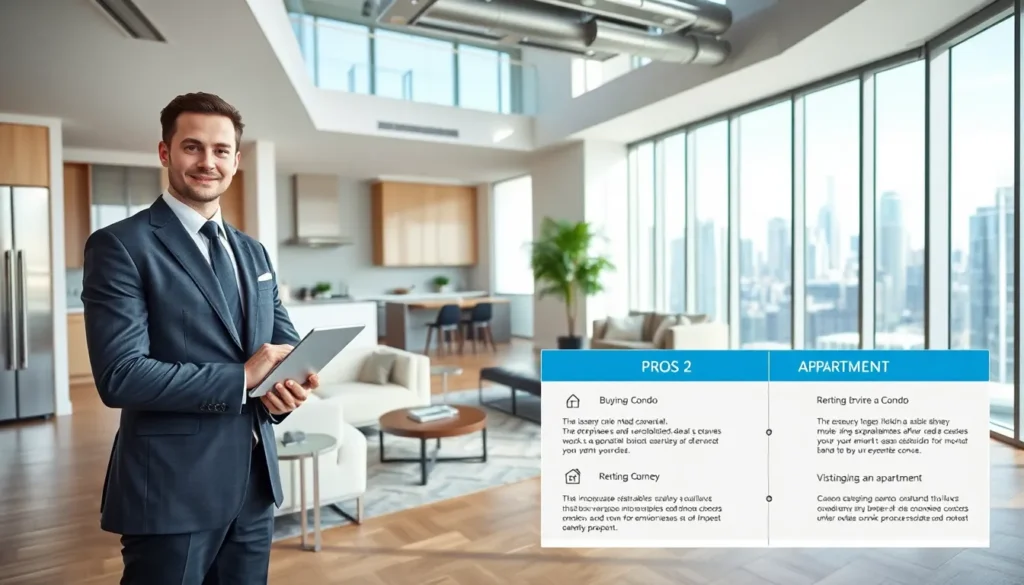Table of Contents
ToggleDeciding whether to buy or rent in the bustling arena of New York City can feel like choosing between a bagel and a slice of pizza, both delicious but each comes with its own set of toppings and complications. In a city where the real estate market can make or break dreams, understanding the ins and outs of both options is crucial. What’s the best path for you? Buckle up for a whirlwind tour through the pros, cons, and everything in between, as we navigate the dizzying choices of living in the Big Apple.
Understanding the NYC Real Estate Market

New York City’s real estate market is famously dynamic. The skyline is not just a collection of buildings but a tapestry representing diverse neighborhoods, trends, and preferences. With a plethora of neighborhoods, from the posh streets of Manhattan to the up-and-coming areas of Brooklyn, deciding where to settle is more complicated than choosing which subway line to take.
The Market Landscape
In NYC, housing prices are notoriously high, but rental options abound. The barriers to entry are significant for buyers, often requiring hefty down payments and navigating complex financing options. This landscape creates two distinct camps: those ready to invest and those preferring the freedom of renting.
Fluctuations and Trends
Real estate trends can change as swiftly as the weather. From interest rates to market fluctuations, understanding these dynamics is essential. Seasonal trends often affect rents and prices, offering unique opportunities throughout the year. Gathering data, market analyses, and neighborhood stats can help clarify the often confusing sea of New York real estate.
Pros and Cons of Buying a Home in NYC
Buying a home in NYC might seem like a grand adventure, who wouldn’t want to be a part of the iconic landscape? But, it comes with its own set of challenges. Evaluating the pros and cons can illuminate whether this path is the best fit.
Pros of Buying
- Equity Creation
As mortgage payments are made, home equity grows, offering a financial cushion in the long run.
2. Stability
Owning a home can provide a sense of permanence in a city known for its transience. Individuals fare better when they know they’re not at the mercy of a landlord.
3. Customization
Homeowners have the freedom to make changes, be it renovations or decor, that reflect their unique personalities.
Cons of Buying
- High Upfront Costs
Down payments, closing costs, and taxes can be staggering. Usually, buyers need at least 20% for a down payment, which is a hefty sum in NYC.
2. Market Vulnerability
Property values can fluctuate. A decline in the market can turn an investment into a costly burden.
3. Less Flexibility
Selling a home can take time. Job changes or personal revelations become more complicated when tied to a property.
The Benefits of Renting in NYC
Renting in NYC might evoke thoughts of making compromises, but it’s not without its perks. Many find that leasing a property grants lifestyle advantages that buying simply can’t offer.
Flexibility and Freedom
Renting typically allows individuals to relocate with more ease. Gone are the lengthy sales processes or potential selling losses, lease-ending dates can be refreshing milestones for those pursuing career moves or personal growth.
Lower Initial Investment
Renters avoid the significant capital needed upfront to purchase a home. Instead, the costs often involve just a security deposit and first month’s rent, allowing people to save in other areas.
Amenities and Services
Many rental properties feature luxurious amenities, rooftop pools, gyms, and doormen, that would be hard to find in an owned space. Renters often enjoy these added perks without the headaches of maintenance.
Financial Considerations: Costs and Investments
When pondering buying vs. renting, one must jump into the costs involved. Financial implications are crucial in making a decision.
Upfront and Ongoing Costs
Buying costs involve down payments, closing fees, and potential homeowners’ association dues. Besides, monthly costs like mortgages and property taxes can become burdensome.
In contrast, renting costs typically only involve rent and utilities. While renters might face rent increases, they do not have to worry about repairing a leaking roof or fixing plumbing issues, costs that homeowners must shoulder.
Long-term Financial Impact
While paying a mortgage builds equity over time, renting allows for easier budget balancing monthly. A solid investment strategy is needed to know when buying a home may become more beneficial in the long run. Understanding the housing market can hold the key to smart financial decisions.
Lifestyle Factors: Flexibility vs. Stability
The lifestyle choices between buying and renting often hinge on individual priorities and life stages. For example, young professionals may thrive on the flexibility of renting, while families may seek the stability of a long-term home.
Flexibility with Renting
Being unencumbered by a mortgage allows for a dynamic lifestyle. Transfers, job opportunities, or even new relationships can lead to changes, renting can accommodate those transitions more readily.
Stability with Buying
Families or individuals preferring security might lean toward buying. Settling down is appealing for many, offering a community connection and rooting oneself deeply in a neighborhood. The investment can feel more powerful, leading to both personal and financial stability.
The Process of Buying vs. Renting in NYC
Navigating the real estate process in NYC can feel like entering a maze without a map. Breaking down the procedures can provide clarity and guide individuals through this complex landscape.
Renting Process
The rental process often involves less paperwork and fewer hurdles. Potential renters typically start by browsing listings, scheduling viewings, filling out rental applications, and signing lease agreements. The speed at which you can secure a rental is usually quite rapid, with flexible terms often available.
Buying Process
Conversely, buying involves a litany of steps. After identifying properties of interest, buyers need to secure financing, offer contracts, and undergo property inspections. The negotiation phase can be lengthy, often requiring meticulous attention to detail and patience. Closing can take weeks or even months, a journey that renters rarely face.




